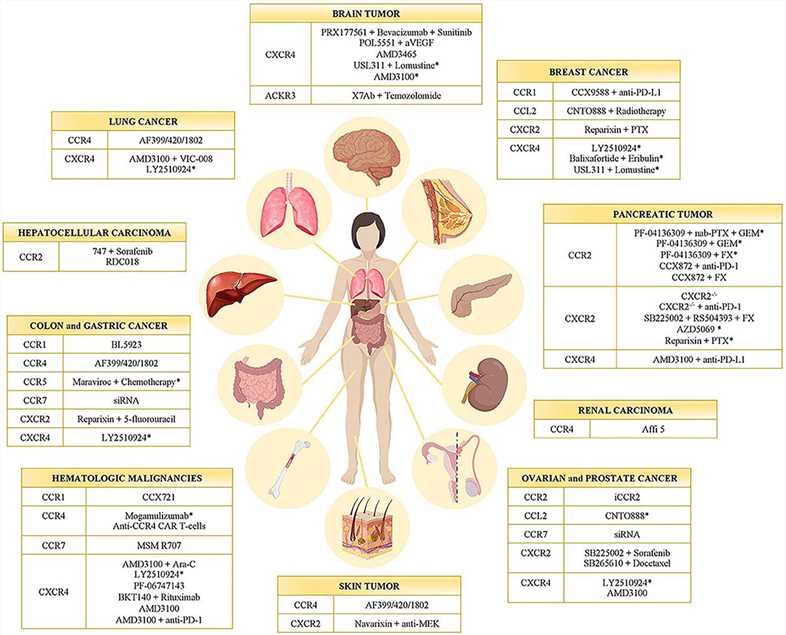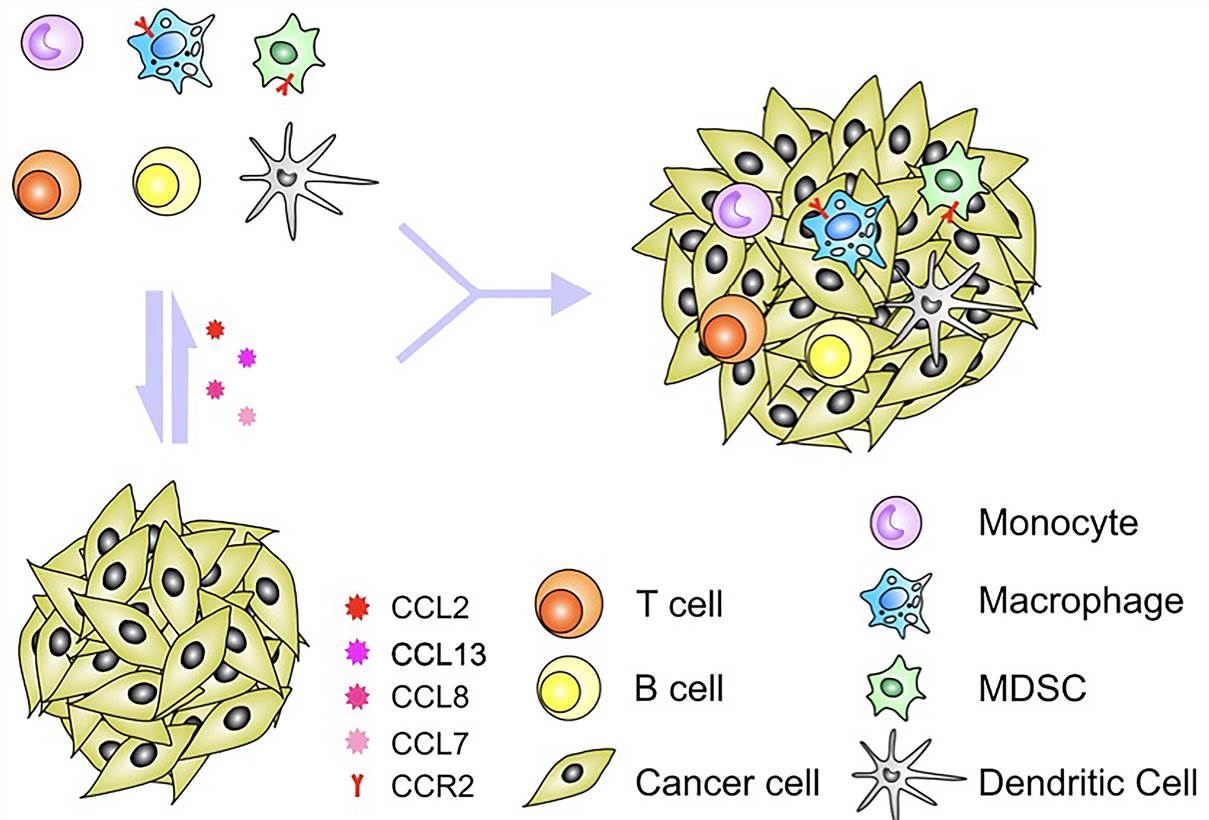CCR2 Assay Portfolio Service
Chemokines are key mediators of the cancer-related inflammation. It exists tumor site for pre-existing chronic inflammatory conditions and is a target of oncogenic pathways. The chemokine CCL2 and its main C-C chemokine receptor type 2 (CCR2) have been shown in the pathogenesis of several cancer diseases. With advanced and high-end technologies, rich experienced scientists, Creative Biolabs is an excellent service provider in the field of tumor marker assay. After long years ahead to fully comprehend tumor markers, we launch our CCR2 assay portfolio service which can be useful for targeted cancer therapy and diagnosis.
Role of Chemokines in Tumors
Chemokines are characterized as a family of secreted, small, and structurally related cytokines, which play a vital role in immunity and inflammation. Inflammation is known as one of the hallmarks of cancer and a crucial component of the tumor microenvironment. In addition, Chemokines are key mediators of the cancer-related inflammation. It exists tumor site for pre-existing chronic inflammatory conditions and is a target of oncogenic pathways.
-
Inflammatory CXC and CC chemokines exert pro- or anti-tumoral roles by recruiting at the tumor site CXCR2+ neutrophils and CCR2+ monocytes that differentiate into tumor-associated neutrophils and tumor-associated macrophages.
-
CC and CXC chemokines play a critical role in tumor angiogenesis, essential for tumor growth and metastatic spreading.
-
Chemokines bind to chemokine receptors expressed by tumor cells, directly promoting cancer cell proliferation activating different signaling pathways.
-
Chemokine receptors expressed by cancer cells promote their migration to metastatic sites.
Chemokines in Cancer Therapy
Targeting the immune system represents a concrete approach against cancer. Research has demonstrated that chemokines and their receptors are involved in several aspects of cancer biology, their possible targeting was evaluated in a variety of cancers.
 Fig.1 Chemokine receptor inhibitors in cancer. (Mollica, 2019)
Fig.1 Chemokine receptor inhibitors in cancer. (Mollica, 2019)
CCR2 and CCL2
CCR2, one of 19 members of the human chemokine receptor family, expresses in multiple cell types including monocytes, endothelial cells, dendritic cells and cancer cells. CCL2, a member of the CC chemokine family, functions through binding to CCR2. In addition to CCL2, CCR2 has several other high-affinity ligands, including CCL7 (MCP-2), CCL8 (MCP-3), CCL13 (MCP-4), and CCL12 (MCP-5), with an order of strength in binding to CCR2 as CCL2 > > CCL13 = CCL8 > CCL7. CCL2-CCR2 signaling axis is implicated in many inflammatory and neurodegenerative diseases such as asthma, atherosclerosis, multiple sclerosis, neuropathic pain, diabetic nephropathy, and cancer.
CCL2-CCR2 signaling axis plays a crucial role in immune cells and the tumor microenvironment. Crosstalk between pro-inflammatory factors and tumor cells in the tumor microenvironment can further amplify the extravasation of tumor cells. Chemokines produced by tumor cells, such as CCL2, drive the generation of several types of regulatory immune cells, including B cell, T cells, and myeloid-derived suppressor cells, and promote further TAM development by enhancing the recruitment of macrophages to the tumor site. Immune Cells in the altered tumor microenvironment subsequently produce chemokines, cytokines and other molecules which facilitate the immune escape of tumor cells.
 Fig.2 Crosstalk between tumor cells and pro-inflammatory factors in the tumor microenvironment. (O'Connor, 2015)
Fig.2 Crosstalk between tumor cells and pro-inflammatory factors in the tumor microenvironment. (O'Connor, 2015)
CCR2 Blockade Assays at Creative Biolabs Including but Not Limited to:
-
Migration assay
-
Invasion assay
-
Metastasis assay
-
Proliferation assay
-
Angiogenesis assay
-
Leukocyte recruitment assay
If you are interested in our service, please contact us or directly send us.
References
-
Mollica Poeta, V.; et al. Chemokines and chemokine receptors: new targets for cancer immunotherapy. Front. Immunol. 2019, 10: 379.
-
O'Connor, T.; et al. CCL2-CCR2 signaling in disease pathogenesis. Endocr Metab Immune Disord Drug Targets. 2015, 15(2): 105-18.
For Research Use Only | Not For Clinical Use


 Fig.1 Chemokine receptor inhibitors in cancer. (Mollica, 2019)
Fig.1 Chemokine receptor inhibitors in cancer. (Mollica, 2019)
 Fig.2 Crosstalk between tumor cells and pro-inflammatory factors in the tumor microenvironment. (O'Connor, 2015)
Fig.2 Crosstalk between tumor cells and pro-inflammatory factors in the tumor microenvironment. (O'Connor, 2015)
 Download our brochure
Download our brochure